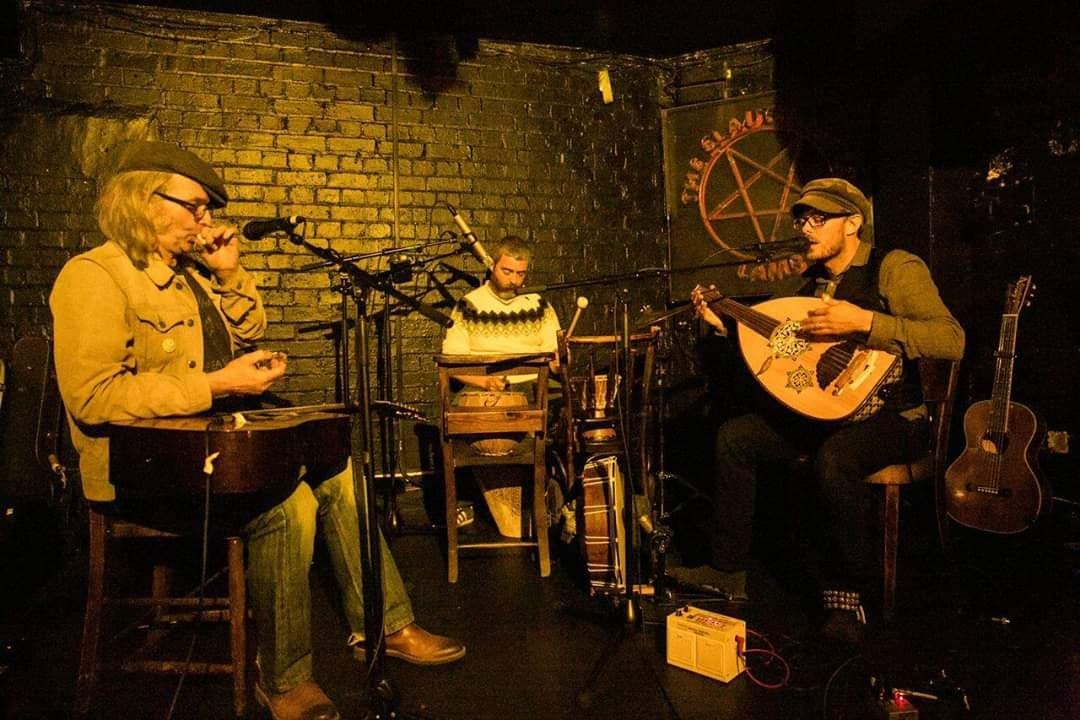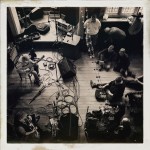 When Australian folk musician Adam Geoffrey Cole releases his first solo LP sometime in the new year, it will most likely not show the typical characteristics of a debut, this fresh, bold, still a bit awkward aura of experimentation, as Cole had already been active with Trappist Afterland for ten years with a new album almost every year. However, we can assume that his music will continue to be the result of a constant search: Trappist Afterland not only advanced to a quality guarantee of dark, mystical folk music shortly after their still rather experimental and psychedelic beginnings, they were also a document of a spiritual search, which accompanied the singer and multi-instrumentalist, who ran the project with numerous friends, from Christian Orthodoxy to Gnostic-esoteric realms and back. The lyrical and atmospheric result was always of an intensity that is capable of captivating even less spiritually oriented listeners. With “Seaside Ghost Tales” the final and perhaps most comprehensive Trappist album was recently released, which marked the end of the band’s history. With a variety of mostly acoustic instruments from the large pool of the traditions of Eastern and Western music and with passionately performed lyrics, it contains all the essential elements that one searches for and finds in Trappist Afterland. In the following interview we talked with Cole about his latest album, his view of the past, the future and much more.
When Australian folk musician Adam Geoffrey Cole releases his first solo LP sometime in the new year, it will most likely not show the typical characteristics of a debut, this fresh, bold, still a bit awkward aura of experimentation, as Cole had already been active with Trappist Afterland for ten years with a new album almost every year. However, we can assume that his music will continue to be the result of a constant search: Trappist Afterland not only advanced to a quality guarantee of dark, mystical folk music shortly after their still rather experimental and psychedelic beginnings, they were also a document of a spiritual search, which accompanied the singer and multi-instrumentalist, who ran the project with numerous friends, from Christian Orthodoxy to Gnostic-esoteric realms and back. The lyrical and atmospheric result was always of an intensity that is capable of captivating even less spiritually oriented listeners. With “Seaside Ghost Tales” the final and perhaps most comprehensive Trappist album was recently released, which marked the end of the band’s history. With a variety of mostly acoustic instruments from the large pool of the traditions of Eastern and Western music and with passionately performed lyrics, it contains all the essential elements that one searches for and finds in Trappist Afterland. In the following interview we talked with Cole about his latest album, his view of the past, the future and much more.
Trappist Afterland has existed for about ten years now. Are you sometimes in the mood for looking back, and if yes, how happy are you with what you have created and how it all went?
I guess in a sense It’s always important to look back and analyse your past work, so as to understand the core of what you’ve done and where you want to go in the future. It’s important to be mindful though to not get to the point of allowing yourself to become too derivative, or repeat yourself too much. Whenever we’ve done a new Trappist album it’s always kind of been a sort of new chapter in the book of trappist, if that makes sense?
I’ve always seen each album as an explanation and reflection on where my head is at in that moment of time, especially where I’m at spiritually. Possibly the first couple of albums had a more orthodox approach in the imagery and lyrics, as at that time I was more interested in orthodox Christianity and Catholicism. Strangely enough though musically those first 2 or 3 albums are our most experimental sounding even though the lyrics themselves come from a more traditional place.
As we started to record “Afterlander”, “God’s good earth” and “Se(VII)en” my interest and downright obsession with mysticism, Gnosticism and the more esoteric forms of Christianity and Eastern mysticism reached its peak, I’d just joined the Apostolic Johanite church (an American Gnostic organisation) and started attending meetings in the Melbourne branch of the church. For me that was such an exciting creative time, music was coming very easily and I was learning so much about myself and the world.
So although the albums are all quite different I’ve always seen them as pieces in a big puzzle, they are all linked and have evolved from one another over the decade or so we were working on the music.
Overall I’m very proud of each and everyone of the 9 albums.
They all have their place and each one reminds me of where my head was when writing and producing them.
So the things that hold the albums together weigh more than the changes…
I guess in a sense, at the end of the day every song is about the same thing.
It’s about seeing God in everyone and everything, and trying to ascend to such a height that, one may become worthy of sharing in such a nature.
Every song and every album contains that message in one way or another.
And such an evolution normally takes lifetimes I imagine.
But with our without any work, whether we want it or not.
Such a nature we all share I think. Whether or not one believes it or not.
It’s simply the fabric of being.
What are the most fond memories you cherish?
I guess besides recording, which I always love doing (I find the whole process intoxicating), it would be touring.
My fondest memories are the 4 tours we did of the UK and greater Europe. I made lifelong friends on those tours, not to mention getting to meet and become friends with some of my biggest influences and favourite artists.
Living in Australia, I never thought I’d get to meet and spend time with folks like David Tibet (current 93), David Colohan and Alison O’Donnell ( United bible studies, Mellow Candle), Tony Durant (Fuchsia) Alan Davidson (kitchen Cynics), Revolutionary Army of the Infant Jesus etc etc.These were all people whose music had such a profound effect on me when I was in my twenties and thirties, so meeting them has certainly been a highlight.
Also getting to play at a terrascope event (Woolf 2) in 2019. I had heard of so much great underground music through that publication, and it was my all time favourite, so getting to play and meet the founders of the magazine and play with so many amazing acts at the last festival was surely a bucket list tick for me.
What would you say are the biggest differences, if you would compare the founding days of Trappist Afterland to today? Do you feel that you, your ideas and your music have changed a lot?
As I said before there are always, and always will be connecting themes to all the music I make, but I guess recently I’ve become more interested in writing and recording more traditional music.
In the early days I was quite obsessed with making challenging, strange but hopefully pretty and moving folk music. Music that would challenge people. I think more recently though I’m most interested in creating more traditional pretty sounding folk music, music that will hopefully make folks feel good. I always found when listening to stuff like Nic jones, Anne Briggs etc etc it gave me that spine tingling feeling that is almost like a warm blanket over your psyche.
Let’s face it, the world at the moment is challenging enough, I’m most interested in making people feel at ease, comforted and happy when they listen at the moment.
Hence the dropping of the Trappist moniker and going solo with my Trappist musical partner Anthony Cornish under my human name (Adam Geoffrey Cole)
“Seaside Ghost Tales” deals a lot with loss and letting go. Would you say that it is something you needed to express before you close the Trappist chapter?
“Seaside Ghost Tales” was the catalyst for finishing the project.
When I was writing and recording the album, I was undergoing a lot of personal changes, and seeing a psychologist to help deal with some past traumas from my childhood that I’d never resolved completely. The album completely deals with that process.
After I’d finished the album, it became completely apparent to me that it would have to be the last album I did under the Trappist moniker. It felt almost like an exorcism of sorts, and a real unpacking of my past life, and an ending of sorts.
I learnt to forgive a lot of people from my childhood during the process and learnt so much about how I process certain things, and why i act as i do in certain situations and scenarios. I also came to understand how this was all profoundly linked to my childhood, growing up in a small town, with a loving, but controlling, temperamental and sometimes aggressive Father.
With this album it really feels like the end of an era, and the start of a new one.
In the last year or so I’ve also been getting away from Gnosticism and back into a more traditional form of belief and worship. 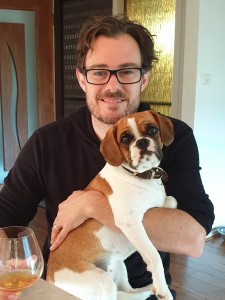 Although I learnt so much from my studies in Gnosticism I found myself losing that real personal connection with the Christ and the divine, and I’ve come to understand for me a more traditional, orthodox approach seems to harvest more fruit.
Although I learnt so much from my studies in Gnosticism I found myself losing that real personal connection with the Christ and the divine, and I’ve come to understand for me a more traditional, orthodox approach seems to harvest more fruit.
I’d never change a thing though, as it was through the whole process of getting away from Catholicism and delving into more esoteric leanings, I’ve been able to have a healthier and more informed grasp on the hidden and exposed mysteries of spirituality and the cosmos. Time to practice what is preached in a more practical way, hopefully.
It’s a very personal album…
Most certainly. All the stories and characters on the album are all based on personal experiences and folks I know or have known.
Ghost stories from a time and place, all things that happened to me or my friends growing up in my home town of Kiama.
“Seaside Ghost Tales” is a long album which not once feels lengthy. At what point in the writing/recording process did it become clear that it would consist of 16 songs?
It is very much divided into 2 parts.
Part one was recorded in my hometown with my childhood best friend Stephen Holmes just before COVID.
Part two was recorded with my TA musical partner Anthony Cornish here in Melbourne during the first COVID lock down.
it was originally meant to be a single album, but the songs kept coming, and they were all connected ghost stories from my childhood home of Kiama, which is on the south coast of New South Wales in Australia. I really would have preferred to have not done a double album, but it became apparent I had to, as I couldn’t let go of any of the 16 tracks on it. Believe me I tried to edit it down to one album, but it just didn’t flow as It needed to.
What should Trappist Afterland be remembered as?
Hopefully as a hardworking band, who tried to write sincere and challenging folk music. We Never cared about trends, and always did exactly what was inspiring us at the time. It’s also simply a journal of one’s, or my spiritual development as an awkward, slightly obsessive human ![]()
Would you call “Seaside Ghost Tales” something like a summing up, a conclusion or something like this?
Without a doubt.
It felt as though it was the final chapter in the Trappist Afterland musical narrative.
How is the situation in Australia nowadays after the bushfires and during the still ongoing pandemic? I remember you thought at least about leaving…
The situation in Melbourne right now is so much better. We spent 18 weeks in pretty tight lockdown during the 2nd wave, but now it seems as though we are on top of it again. Zero cases for 6 days. Fingers crossed it continues in the same way. As for the bushfires, surely they can’t be as bad as last year’s firestorm. It’s not too hot here yet though, by December when the heatwaves hit, we will see.
I’d love to move abroad to Europe or the UK one day though, after all this Covid carnage subsides.
Nowadays it seems inevitable to ask to what extent the Corona pandemic has influenced you (creatively, personally etc.).
I’ve had plenty of time to write that is for sure.
I wrote the whole new solo album ‘Fallowing’ during the first and second lockdowns. Although the album isn’t necessarily about the pandemic, it’s been impossible for it to not have a huge influence over it, and most obviously the title of it expresses that.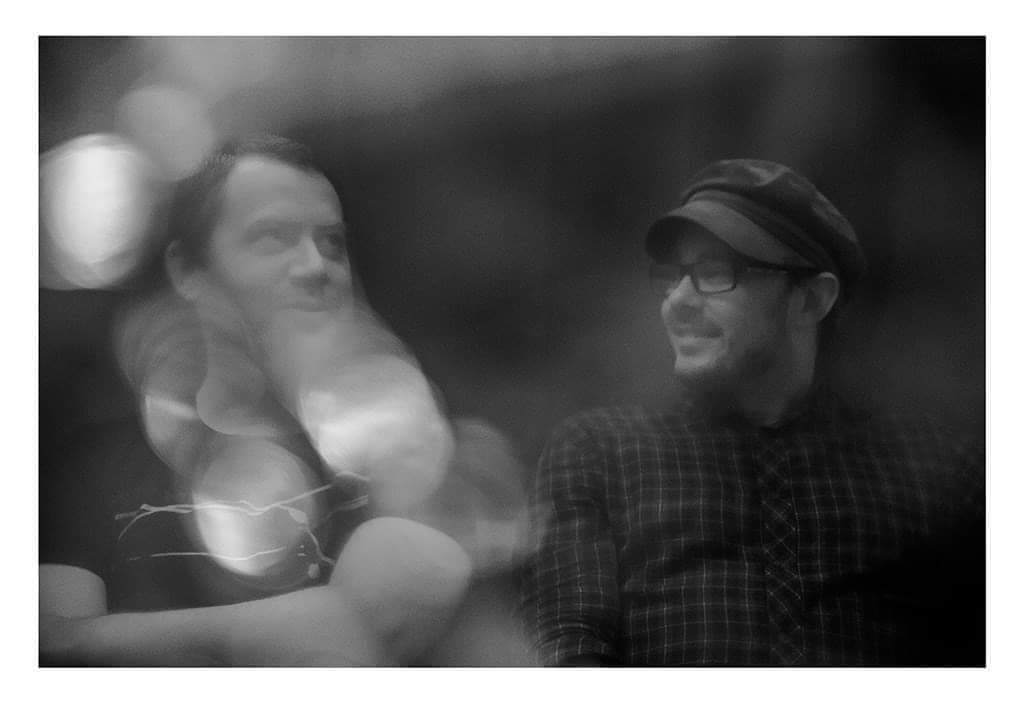
Is the live music scene very different over in Australia?
Very much so. To be completely honest I feel a little alienated in my home country. Not many folks play the type of music we do, so it’s sometimes hard to put together bills and shows. I have found the audiences to be a lot more receptive in the U.K., Europe and the States. We also sell the majority of our recorded works abroad rather than locally here in Oz. I do love Australia though, trying to get my wife and daughter to move overseas with me is probably not very likely.
So between that and the pandemic I imagine Australia is where I’ll be, for at least the near future, and that is ok ![]()
In the Berlin shows, a number of musicians from Constantine accompanied you on stage, and I think you’re a passionate collaborator anyway. How important is cooperation for you as a musician and what makes a good collaborator or band mate?
I had a wonderful time with Constantine and his band on that tour, although it was an incredibly hectic schedule, hence everyone was completely shattered by the time we got to the Netherlands. Constantine’s music is so fabulous too, he is a very gifted songwriter and arranger.
During 2020 I was lucky enough to collaborate with Grey Malkin on an album, and we are about to release its follow up. I feel like Grey and I are real kindred spirits so I’ve enjoyed working with him immensely. I imagine that will be an ongoing project with him.
I also did a single with one of my favourite folk singers – Kathleen Yearwood from Canada. That was really fun to hear her amazing beautiful voice on Trappist music. She is a sweet soul too.
As for what makes a good bandmate and collaborator I couldn’t go past my long time Trappist partner Anthony Cornish. We have been working together for over 2 decades now and it’s so fun and easy to do music with him. After working with someone that long it’s almost as though you can read each other’s minds when working in the studio. He is one of my best friends and I can’t imagine not working with him.
The last time we talked, you mentioned an upcoming split-release (a tape) with Stone Breath. Is still going to happen?
I doubt that will happen unfortunately, I’ve not heard from Timothy in a while, but I’d always be open to it. I adore Stone Breath, and their music has been a big influence on ours.
Are there any other artists (musical, visual etc,) that you would like to work with?
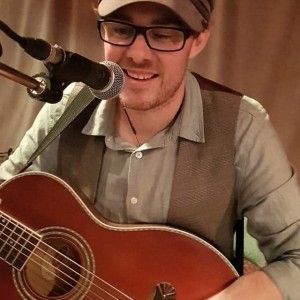 I would love to do something with David Tibet sometime, no one writes more amazing and evocative music than him in my opinion. Maybe one day, but he is a very busy man. Be cool to do something with Alasdair Roberts too, but I’ve only met him once very briefly, but one can only hope.
I would love to do something with David Tibet sometime, no one writes more amazing and evocative music than him in my opinion. Maybe one day, but he is a very busy man. Be cool to do something with Alasdair Roberts too, but I’ve only met him once very briefly, but one can only hope.
We have plans in 2021 to do a split release with Walker Phillips (San Francisco’s best new acid folk troubador) and I’m wanting to do a song or two with my close friend Jon Chinn too hopefully as well.
Speaking of Jon Chinn his new album Golitha is coming out soon via Trace imprint, it is an outstanding album.
I’m super excited to get it and listen to it in its entirety on wax.
What are your favorite (folk or other) records these days?
So many- a lot of trad stuff and artists from the topic and trailer label have been getting regular spins of late. Way too many to mention though.I really enjoyed Alula Downs last couple of releases recently. They are a great duo.
I wonder how strong the influence of your home country, its landscape and culture(s) might be on your music. It might be a cliché, but a lot of images I saw of Australia have evoked associations to something old and prehistoric, which I automatically connect to the somehow mythological atmosphere of your music. I wonder if you can connect to this idea…
Landscape, especially the Australian surroundings have always been a massive influence on all my work. Even when I was first starting to write songs in my youth it was huge for me.
Australia has such a vast array of different types of places to explore- from the rugged coastlines, the rainforest, deserts and plains there is a plethora of shapes and smells one can be influenced by when composing.
We don’t want to be too curious about future works, but do you think that something of the typical Trappist atmosphere will still be recognisable in forthcoming endeavors?
Without a doubt.
The new works (although a little more stripped back) will still be very similar to Trappist in the themes and sound of the songs. It is still just Anthony and I, so it would be hard to escape that. But although similar I’m hoping it will have a fresh sound and somehow encapsulate a more positive and comforting atmosphere.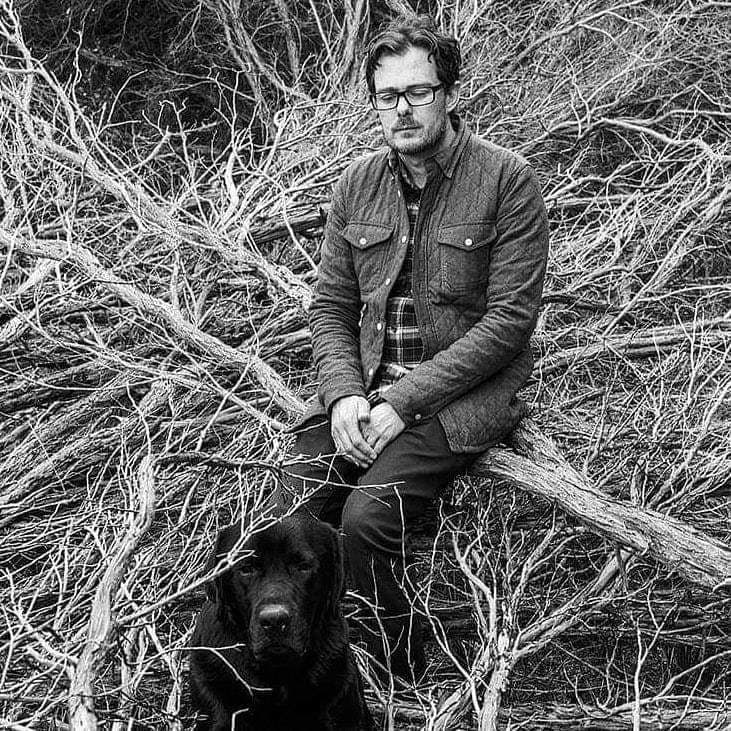
Still lots of different instruments will be used and the themes will still deal heavily in spirituality and a search for connection and all sorts of godbothering lyrics;)
But it’s nice to end one chapter and start a new. 2020 has been a very fruitful but also a very hard year, so here is to new beginnings.
(Interview: M.G. & U.S.)
Trappist Afterland @ Bandcamp | Discogs | Facebook | Instagram

